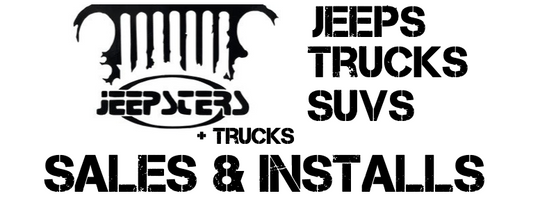It appears that your cart is currently empty
What to do and not to do when getting your Jeep un-stuck!
What is Offroad Recovery?
Offroad recovery refers to the techniques and practices used to safely extract a stuck or disabled vehicle while offroading. Whether you're driving a Jeep, truck, or trail rig, it's important to know the do's and dont's of offroad recovery to ensure your safety and the preservation of the environment.
Do: Assess the Situation
Before attempting any offroad recovery, take a moment to assess the situation. Determine the type of terrain, the condition of your vehicle, and the severity of the situation. This will help you choose the appropriate recovery method and equipment.
Don't: Panic
Offroad recovery can be a stressful situation, but it's important to stay calm and composed. Panicking can lead to poor decision-making and potentially worsen the situation. Take a deep breath, assess the options, and proceed with caution.
Do: Use Proper Equipment
Having the right equipment is crucial for a successful offroad recovery. Some essential items include a recovery strap, a snatch block, a winch, a shovel, and a set of traction boards. Make sure your equipment is in good condition and properly rated for the weight of your vehicle.
Don't: Use Improper Attachment Points
When attaching recovery equipment to your vehicle, it's important to use proper attachment points. Avoid attaching to weak or vulnerable areas such as bumpers, tow balls, or suspension components. Instead, use dedicated recovery points or frame-mounted attachments designed for offroad recovery.
Do: Communicate and Coordinate
Offroad recovery often requires the assistance of others. Communicate your plan with your recovery team and establish clear signals or radio communication to ensure everyone is on the same page. Coordinate your efforts to maximize safety and efficiency.
Don't: Rush the Recovery
Offroad recovery can be time-consuming, but rushing the process can lead to mistakes and accidents. Take your time to properly set up the recovery equipment, assess the situation, and execute the recovery plan. Patience and attention to detail are key.
Do: Practice Environmental Stewardship
Offroading is a privilege, and it's important to practice environmental stewardship. Stay on designated trails, avoid sensitive areas, and minimize your impact on the environment. Dispose of waste properly and leave the area in better condition than you found it.
Don't: Attempt Recovery Beyond Your Skill Level
Offroad recovery requires skill and experience. It's important to know your limits and not attempt recoveries beyond your capabilities. If you're unsure or uncomfortable with a recovery situation, seek the assistance of a professional or more experienced offroaders.
Conclusion
Offroad recovery is an essential skill for any offroader. By following the do's and dont's of offroad recovery, you can ensure a safe and successful recovery while minimizing damage to your vehicle and the environment. Remember to assess the situation, use proper equipment, communicate effectively, and always prioritize safety.


0 Comments